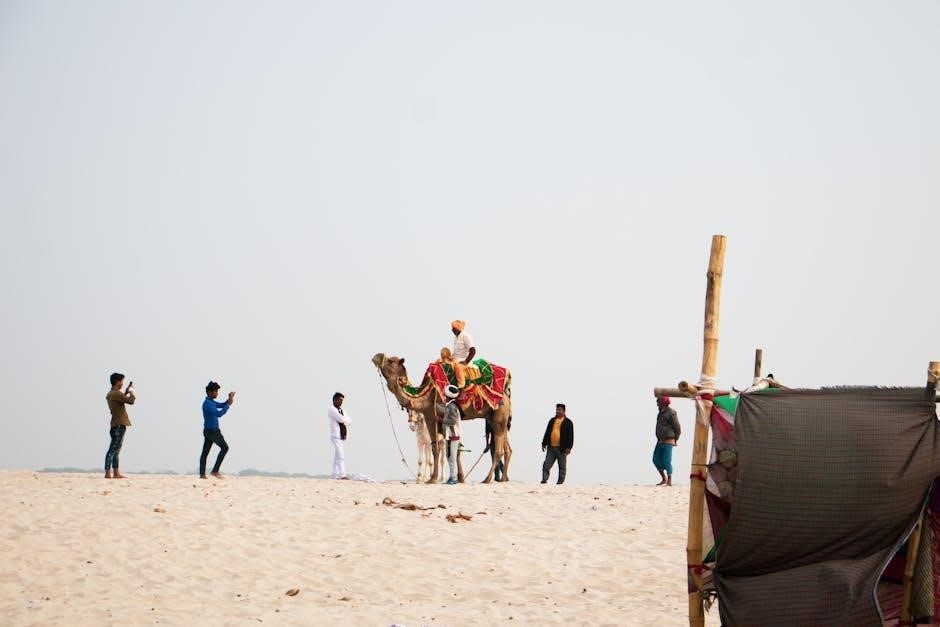A safari tour guide is the cornerstone of an unforgettable adventure, offering expert insights and ensuring safety while connecting enthusiasts with wildlife. Their passion and knowledge make every journey unique and memorable.
What is a Safari Tour Guide?
A safari tour guide is an experienced professional who leads groups of travelers on wildlife adventures, ensuring a safe and enriching experience. They possess deep knowledge of local ecosystems, animal behavior, and conservation efforts. Guides are trained to navigate diverse terrains, from savannas to forests, and often specialize in specific regions or types of wildlife. Their expertise allows them to spot and identify animals, providing detailed insights into their habitats and behaviors. Safari guides also play a crucial role in promoting conservation and educating tourists about environmental issues. They often act as photographers, drivers, and first responders, making them multi-skilled individuals. Whether on foot, in a vehicle, or by boat, a safari guide ensures that participants have an unforgettable and educational journey while maintaining safety and respect for nature. Their passion and dedication are key to creating memorable experiences for travelers.
Types of Safari Tours

Safari tours come in various forms, catering to different preferences and interests. Traditional wildlife safaris focus on observing animals in their natural habitats, often conducted in 4×4 vehicles. Walking safaris offer a more immersive experience, allowing participants to explore on foot with expert guides. Photographic safaris are designed for enthusiasts, providing optimal opportunities to capture stunning images of wildlife. Family safaris are tailored for groups with children, ensuring engaging and educational experiences. Birdwatching safaris cater to ornithologists and enthusiasts, focusing on spotting rare and diverse bird species. Luxury safaris combine high-end accommodations with exclusive wildlife experiences, while specialized safaris might focus on specific themes like conservation or tracking the Big Five. Each type ensures a unique and unforgettable adventure, tailored to individual interests and preferences.
Benefits of Hiring a Professional Safari Guide
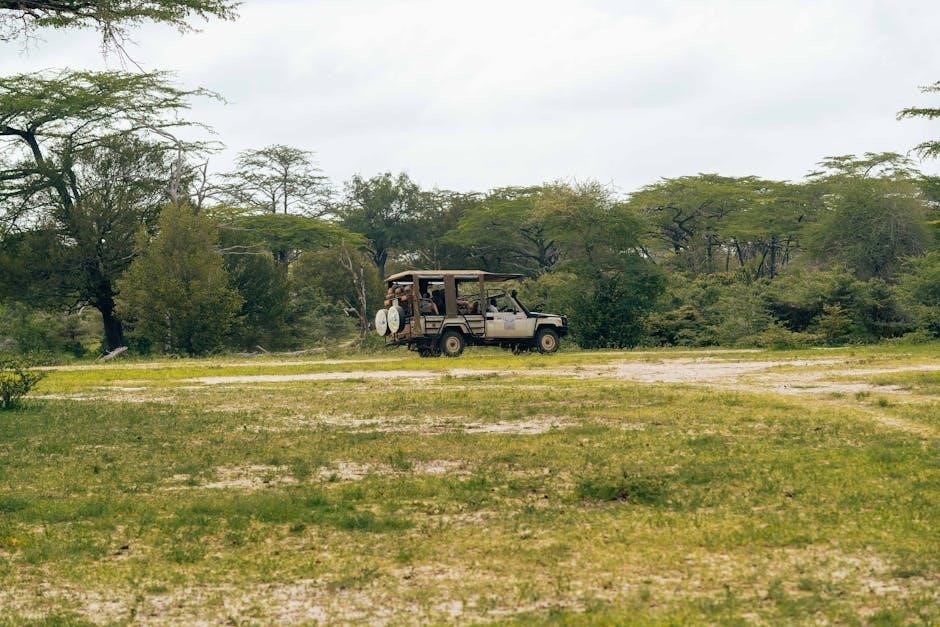
Hiring a professional safari guide offers numerous advantages that enhance the overall safari experience. Firstly, guides possess extensive knowledge of wildlife behavior, habitats, and ecosystems, ensuring tourists gain deeper insights into the natural world. Their expertise in tracking and spotting animals increases the likelihood of encountering rare or elusive species, making the tour more rewarding. Safety is another critical benefit, as guides are trained to handle emergencies and navigate challenging terrains, ensuring participants’ well-being. Additionally, professional guides often have local connections, providing access to exclusive locations and experiences. They also manage logistics, allowing tourists to focus on enjoying their adventure. Moreover, guides play a crucial role in promoting conservation by educating visitors about environmental issues. Their leadership and communication skills foster a cohesive group dynamic, creating a memorable and enriching journey. Overall, a professional safari guide elevates the tour from a mere observation of wildlife to an immersive and educational experience.
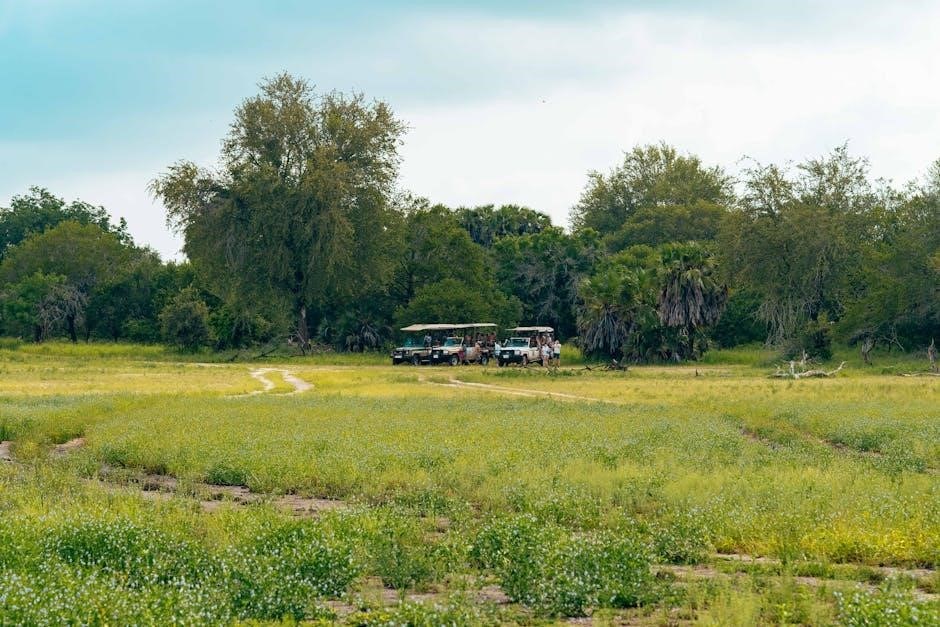
Key Responsibilities of a Safari Tour Guide
A safari tour guide ensures safety, provides wildlife insights, manages logistics, navigates terrain, and enhances the overall experience to make it unforgettable for all participants.
Ensuring Safety and Well-being of Tour Participants
Safari tour guides prioritize the safety and well-being of participants, conducting thorough risk assessments and sharing safety guidelines before and during the tour. They are trained in first aid and emergency response, ensuring quick action in critical situations. Guides expertly navigate challenging terrains and monitor weather conditions to avoid hazards. Their deep knowledge of wildlife behavior helps maintain a safe distance from animals, minimizing risks. Clear communication and alerts are provided to participants to ensure awareness and cooperation. Additionally, guides carry essential safety gear and emergency supplies, staying prepared for unforeseen circumstances. Their proactive approach creates a secure environment, allowing participants to focus on enjoying the safari experience; By balancing safety with adventure, guides ensure a memorable and stress-free journey for all. Their expertise is crucial in safeguarding both people and wildlife, making safety a top priority throughout the tour.
Providing Detailed Information About Wildlife and Ecosystems
Safari tour guides are experts in wildlife behavior and ecosystems, offering in-depth insights to enhance the tour experience. They identify and explain the unique characteristics of animals, birds, and plants, sharing fascinating facts about their habitats and roles in the ecosystem. Guides provide detailed information on animal behavior, such as feeding patterns, mating rituals, and social structures, helping participants gain a deeper understanding of the natural world. Their knowledge extends to conservation efforts, highlighting the importance of protecting endangered species and fragile environments. By sharing stories about the interconnectedness of wildlife and ecosystems, guides create a richer, more immersive experience. Their ability to communicate complex information in an engaging way makes the safari both educational and enjoyable, turning observations into meaningful connections with nature. This expertise ensures that participants leave with a newfound appreciation for the diversity and complexity of the ecosystem.
Handling Logistics and Navigation
Safari tour guides are adept at managing the logistical aspects of a tour, ensuring a seamless and stress-free experience for participants. They handle route planning, navigation, and coordination, often traveling through remote and challenging terrains. Guides are skilled at reading maps, using GPS devices, and knowing the best routes to maximize wildlife viewing opportunities. They also manage vehicle maintenance, ensuring that the safari vehicle is in excellent condition to handle rough terrain. Additionally, guides oversee the arrangement of accommodations, meals, and permits, taking care of all behind-the-scenes details. Their expertise in logistics allows the group to focus on enjoying the experience while they handle the practicalities. Whether it’s adapting to changing weather conditions or coordinating with local authorities, safari guides ensure that every aspect of the tour runs smoothly, making the adventure both enjoyable and memorable. Their ability to navigate and organize is crucial to the success of the safari.

Essential Skills and Qualifications
Safari tour guides must possess extensive knowledge of wildlife, ecosystems, and conservation. They require first aid certification, navigation skills, and strong communication abilities to lead groups effectively and safely.
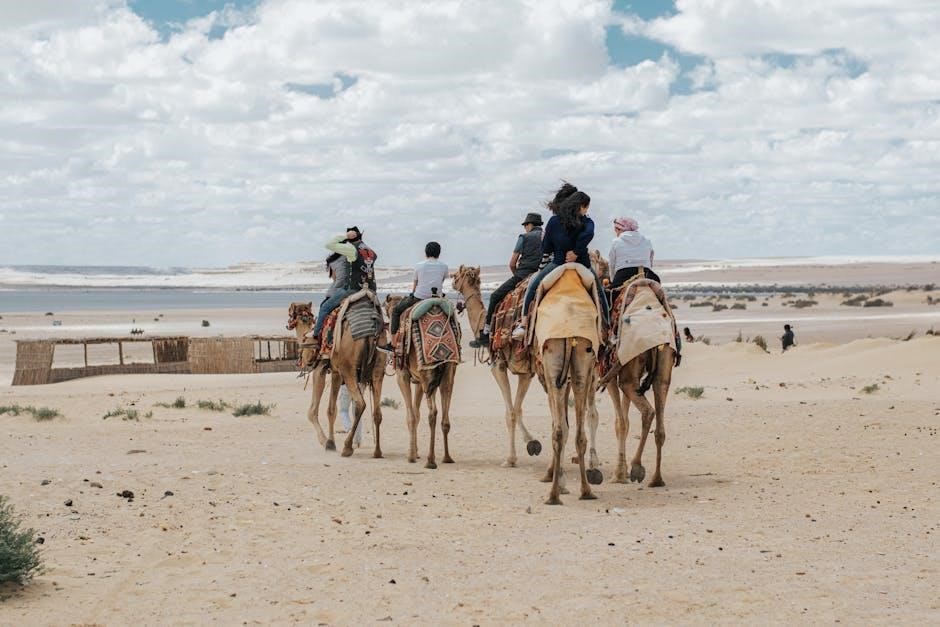
Knowledge of Wildlife Behavior and Conservation
A safari tour guide must have in-depth knowledge of wildlife behavior, habitats, and conservation efforts. This expertise ensures an authentic and educational experience for tourists. Guides must understand animal migration patterns, breeding seasons, and social structures to predict movements and locate species effectively. They should also be familiar with local ecosystems, including vegetation and terrain, to provide context about the environment. Knowledge of bird species, reptiles, and insects further enhances the tour’s diversity. Additionally, guides should stay updated on conservation initiatives, sharing insights into efforts to protect endangered species and combat threats like poaching or habitat loss. This understanding not only enriches the tour but also fosters a deeper appreciation for wildlife among participants. By combining observation skills with factual knowledge, guides contribute to both the enjoyment and conservation of natural wonders. Their role is pivotal in promoting awareness and respect for the wild.
Strong Communication and Leadership Skills
Effective communication and leadership are essential qualities for a safari tour guide, ensuring a seamless and engaging experience for participants. Guides must articulate information clearly, whether explaining wildlife behaviors, safety protocols, or cultural insights. Their ability to engage diverse groups, from enthusiasts to families, fosters a positive and inclusive atmosphere. Leadership skills enable guides to manage group dynamics, maintain order, and make swift decisions in dynamic environments. They must remain calm under pressure, addressing concerns and resolving conflicts with tact. Strong verbal and non-verbal communication helps in conveying enthusiasm and passion for wildlife, keeping the group motivated and informed. Additionally, guides should be adept at storytelling, sharing anecdotes and historical context to enrich the tour. Their leadership ensures safety, while their communication fosters connection and understanding, creating lasting memories for all participants. These skills are vital in delivering an unforgettable safari adventure.
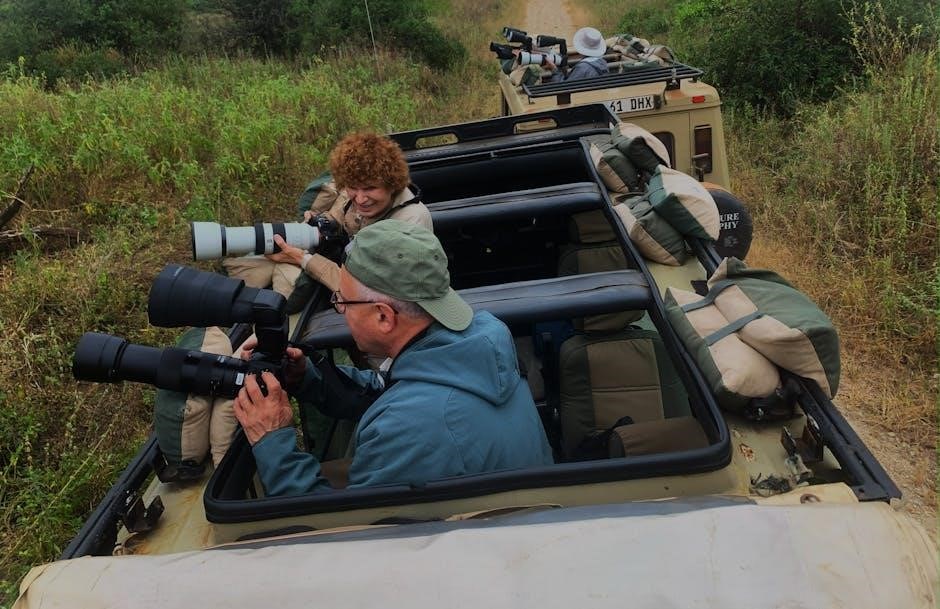
First Aid and Emergency Response Training
First aid and emergency response training are critical components of a safari tour guide’s expertise, ensuring they can handle unforeseen medical situations effectively. Guides are often required to operate in remote areas with limited access to medical facilities, making their ability to provide immediate care essential. Training typically includes certification in CPR, wound management, and handling injuries such as fractures or burns. Guides also learn to recognize and respond to allergic reactions, snake bites, or other wildlife-related incidents. Emergency response protocols may involve assessing situations, stabilizing patients, and coordinating evacuations when necessary. This training not only protects tour participants but also builds trust and confidence in the guide’s ability to manage crises. By staying calm and acting decisively, guides can prevent minor incidents from escalating, ensuring a safe and enjoyable experience for everyone. Their proficiency in first aid is a cornerstone of responsible and professional safari tourism.
